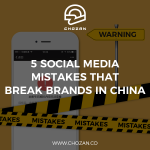The vitality and dynamicity of the Chinese market often amaze business leaders around the world; recently the market is observed undergoing two major phenomena: Consumption Upgrade and the Rise of Social Media E-commerce.
The former refers to the increased and shifted demand of the Chinese consumers (especially the younger generations like Generation Z): they are demanding for more in quantity, and their wish lists nowadays cover not only the daily necessities categories, but also the luxury and body-care division (skincare and cosmetics products in particular). Such a trend can be understood as the result of the increased purchasing power and improved living standards of the Chinese consumers, causing them to focus more on their personal image and lifestyle. ‘Beauty is Justice. (颜值即正义)’ is now their new motto.
The latter is best interpreted as the proliferating use of social media platforms among the Chinese population. Every aspect of the modern Chinese life is somehow connected to social media and information technologies; people are now more adapted to consume and connect with others through online means, leading to the emergence of new marketing and e-commerce models.
Combining the two phenomena, one can easily notice the enormous potential of developing the skincare and cosmetic industry online in China nowadays. This article is written for those who are interested in exploring the field, introducing the notion of Social Media Marketing and the most suitable platforms for practicing the marketing strategy. Tips on how to promote products successfully on these platforms shall be given during the discussion.
Why is Social Media Marketing important?
Often abbreviated as SMM, Social Media Marketing is a new form of online promotional strategy integrated with features of social media platforms like following, sharing and discussions to spread marketing messages and highlight brands’ products through online interpersonal networks and social interactions. Nowadays in China, strategies as such have been adopted by many firms in their product promotion plan, generating billions of new revenues and profits to multiple industries. Take the beauty-skincare industry as an example, according to the White Paper Report on the Beauty-makeup Industry on Weibo 2018, the new social media marketing for skin care strategy has opened up new ways of interactions (increased and more direct) between brands and consumers, greatly reduced the transaction costs (for instance, research time and efforts) and therefore stimulate further demands of the consumers on their desired products. As a result, in 2018, China was found to account for around 50% of the world’s skincare and cosmetic market and to be one of the fastest growing markets internationally.
What does Social Media Marketing mean to shareholders in the field?
What is so attractive about this model?
- For Consumers: To a large extent, this new method of e-commerce has further extended the freedom and safety of the consumers in the market by making more product / brand choices available and comparison between products / brands easier. Also, the new method allows consumers to have closer communications and interactions with the product providers during the course of purchasing, such that they can know more about the brand and their targeted products, and have a higher chance of getting the interested questions answered. Apart from that, under this new model, consumers are freer and motivated to share their experiences with the products / services in their own words or ways of expression, making themselves an influencer (possibly a KOC) in the consumers’ circle.
- For Brand Owners / Marketers: it is a golden opportunity to learn more about their users’ experiences, the demography of their users and the overall demands in the market. Besides, they can create their own creative content to attract the attention of more audiences on their products (a relatively easier way of advertising) and build up a community of fans for their brand where possible. Within this community, recommends (种草 in Chinese, from the brand / KOLs / KOCs), which is a long-term product promotion to consumers (in contrast to one-time advertisements) becomes possible, substantially increasing the conversion rate of the brand’s promotional efforts.
- For Platform Operators: What concerns platform operators the most is the traffic and volume flow of their platform. This new form of marketing strategy can ensure them to have stable traffic flow onto their platform, help them to gather data to make better segmentation of users and provide information to their users in a more precise manner.
In short, the core strength of Social Media E-commerce lies in its ability to enable brands to promote their products in accordance to its consumers’ personal social network, which in turn making promotion work much easier and effective; establishment of loyal customer community which provides stable support to the brand becomes possible.
Social Media E-commerce vs. Traditional E-commerce
| Social Media E-commerce | Traditional E-commerce | |
| Nature | User-oriented Decentralized Relationship-oriented | Product-oriented Centralized Network-flow-oriented |
| Role of Brand Owners | Product Promoter / UX Listener | Product Promotor |
| Role of Consumers | Information Receiver / Commentator / Product Promoter / KOCs | Information Receiver |
| Means of getting info | – Long-term Recommendations by KOLs / KOCs (种草) – Friend’s sharing – Updates from followed brands | – Search Engine on E-commerce Platform – Platform Seasonal Recommendations (For example: Double 11 / 618) |
| Consumption Scenario | Heterogeneous | Homogeneous / Simple |
| Consumers’ Loyalty | Higher | Lower |
| Key Sales Factor | Quality Word-of-mouth | Quality Internet Flow Volume |
| Possible Forms | – Membership – S2B2C Model – Micronet (微商) – Group purchasing (拼团模式) – Content Community | / |
Top 6 Social Media Marketing Platforms for Skincare & Cosmetics in China
As mentioned, the SMM strategy is applicable and beneficial to the development of a wide range of industries. The skincare market and cosmetics market is a good example. Here are the top 6 platforms where brand owners can use the same strategy to succeed in the Chinese market.
1. WeChat
With more than one billion active monthly users, WeChat has been the main platform for social commerce. Brands can create mini-program e-commerce stores of their own and drive traffic through digital advertising, influencer marketing, and other creative social media marketing campaigns.

For example, Burberry teamed up with an influencer called Mr. Bags to launch a new, limited-edition collection of pocket handbags. In doing so, MrBags would create a post and embed Burberry’s mini-program shop. This combination includes a link that leads directly to the product page, where users can browse the item details and make a purchase with WeChat Pay for a seamless experience.
Such WeChat campaigns have become popular among luxury brands as they look to create more customized, unique campaigns that cater to a more upscale customer base. In short, WeChat enables them to create a unique customer experience that is hard to replicate on a broader e-commerce marketplace.
2. Weibo
Weibo, which literally means “microblog”, is the major digital platform in China. With its enormous monthly user group of over 550 million, the platform is now the core marketing place for the cosmetic and skincare industry. According to the White Paper Report on the Beauty-makeup Industry on Weibo 2018, discussion on cosmetic and skincare products on the platform has increased by 35%. Research shows that social media is an important source for modern consumers to get information about their interested products, and can help consumers to get recommendations and make better purchase decisions.
Besides, the platform is famous in its diversity for expression: users can express themselves in forms of text contents, images, videos, live streams (by self or KOLs), etc., making their content / recommendations much more interesting to their targeted audiences. Such a strength is highly desirable for image-oriented products like cosmetic items.
Apart from that, the introduction of the ‘U微Plan’ in 2018 has further strengthen the leading role of the platform in social media marketing: under the plan which combines social data and e-commerce information, brands owners can have a much deeper understanding about the social and consumption behaviours of their followers, and then they can create consumption scenarios accordingly and provide information more precisely to their targeted group.
Meanwhile, the combination of Weibo and e-commerce can enable consumers to participate in the production process (which is impossible in traditional e-commerce): consumers can express their opinion to the producers and become an active agent in the process of product research, design, sales and services, making the best consumer experience possible.

Dyson is a good example to show the power of this new form of marketing: the company is one of the testing ground for the ‘U微plan’; with the help of Alibaba’s analytical tools and and Weibo’s social network, it was found that most of Dyson’s fans are lovers of pets and they also like to follow groups or posts related to pet-care. Therefore, when Dyson was investing in advertisement, it precisely target this group of pet lovers and was able to trace more (usually friends of their fans) with similar interest; the advertising efforts ended with huge success, many pet lovers have learnt that Dyson was super good in helping them to deal with pet’s fur and dirt. Long-term customer relationships were then formed.
3. Pinduoduo
Established in Sep 2015, Pinduoduo is a third-party social e-commerce platform focusing on C2B group-buying. Through group-buying with friends, relatives and neighbours, users can purchase quality products at a lower price. Such social-oriented nature has made Pinduoduo a unique service provider in the field. Within a year since its launch, the platform has already made records like number of daily transactions reaching 10 millions and that of paid users reaching 20 million. Such statistics shows that the platform is growing at an unprecedented speed, achieving milestones which took other platforms 3-4 years to do so.
At this moment products on the platform can be divided into 9 major categories: Clothes / Bags, Digital Devices, Food & Beverages, Home Appliances, Cosmetic Products, Home Textile, Maternal-child Products and Fresh Food / Fruits. By enabling group-buying, consumers can then have a joint consumption experience and share the joy with their friends and relatives.
In June 2019, the platform introduced the ‘Subsidy Plan of 10 billions’ which provides subsidy (at around 20-50% of the products’ price) to a selected list of brands and products so that they can be sold at a lower price. The result of this move is observed to be tremendous: customers from lower tier cities are attracted to buy more, and the number of users on the platform until now has grown to nearly 600 million.
The group buying model derived from social e-commerce and the subsidy plan are indeed favourable factors for the further revenue growth of cosmetic products. Take the world famous brand SKII as an example, under the model and the plan, the brand’s products could then be sold at an unprecedentedly low price, attracting millions of customers from all corners of the country to become long-term customers to the brand.
4. RED
RED or Xiaohongshu is an e-commerce platform. But it is above all a platform that provides users with shopping tips, product reviews, advice, and promotional offers. RED gets a rapid development these years.
As of July 2019, the app already has more than 300 million registered users. By providing useful content, RED is keeping its users on its platform every day. It analyzes the data of its subscribers so it can deliver customized content according to their tastes and expectations. The application keeps developing this group cohesion by strengthening the community’s feelings of individuals.
On 15th August this year, RED officially launched the new function ‘Video Account (视频号)’. In the coming half year, the platform shall provide billions of view flows, commercial resources and monetary support to the quality video content providers. Meanwhile, the platform has also planned to upgrade its functions so as to lower the costs and requirements for video productions, hoping to further solidate the platform’s status as a major content community in China.
Tong Yao (童瑶), an actress who starred in a hit drama show 30 Only (三十而已), is a good example to show how SMM strategy can be applied successfully for the promotion of cosmetic products on this platform. In July 2020, the popular actress launched her account on RED. With over 52 thousand likes, 4014 comments and 16 thousand favourites, her first video promoting cosmetic products on the platform has made her the No.1 liked content provider in the category.
In the video, she recommended the sunscreens from Axxzia, CPB, Allie and Ajuste, explaining the strengths and weaknesses of each of them. This shows that prior research is required if one wishes to convince and stimulate the demand of other users on the platform.
Another good example to show how cosmetic products can be promoted with the strategy is 曼斯里里. 曼斯里里 is an account specified in recommendations of cosmetic product; recently this account has launched a ‘Gain for Free (0元领)’ lucky draw activity on the platform with 10 pieces of 3CE lip stain in order to attract likes, shares, favourites and comments from the users. That post was found to be a huge success, on 15th July alone the activity had already brought over 114 thousand likes and 6000 news fans to the account.
5. Yunji (云集)
Yunji is a membership-based e-commerce platform. By careful selection of brands and products (to be the sellers on the platform), the platform aims at providing its members the products with the best ‘price–performance ratio (性价比)’. Range of products covers many aspects of modern Chinese daily life, for instance, 3C digital items, children’s toys, fresh food and fruits, etc.. Platforms with such nature is particularly suitable for the promotion of luxury body-care products since it can help brand owners to attract consumers with specific demands and keep a sense of high-class consumption to the consumers (since the products are carefully selected in advance). At the same, from the perspective of the consumers, buying on Yunji is a desirable move since the product prices on Yunji are often set at the wholesale price level, i.e. they can pay less for products with higher quality.

Here is an example showing the power of the platform: Innovative Brand Beely joined the platform by the end of 2017. In December that year, in cooperation with the platform, the brand launched a new body-care product. As recalled by the brand’s CEO, the price and quality of body-care products at that time varies a lot at that time; Yunji insisted to provide its members with the best products, which matches the philosophy of the brand, leading them to be in a partner relationship. Since 2018 until now, the related products have already achieved a sales value of over 350 million RMB.
As an e-commerce platform driven by social network, members on Yunji become efficient connectors and communicators between brand and end-users. This advantage is found to be a crucial factor for the success of Beely. On traditional e-commerce platforms, brands can only ‘test’ the popularity of new products by launching at least 5-10 items each year; the answer is often not clear or precise. However, on Yunji, brands can obtain comments from users easily and instantly and new products can be made in accordance to these comments, greatly increasing the chance of creating hit products.
6. Beidian (貝店)
Baidian, the No. 1 fast-growing platform in MUA in 2018, has a social platform nature similar to Yunji. However, what makes the platform different from Yunji is its better precision and lower entry costs. On Beidian, each user can become an online shop owner by accumulating experiences; these experience / growth values can be accumulated by means like purchasing or interactive sharing.
According to guidelines provided by the platform, the quickest way to become an online shop owner on the platform is to buy / recommend friends to buy 20 orders. Ways as such can greatly reduce the establishment costs of doing business on the platform, provide incentives for the users to expand their network and further attract more to get engaged with the platform, which in turn brings benefits to this relatively new (with a history of around 2 years) social media marketing platform.
Key Tips to Marketing Successfully on These Social Media Platforms
- Study the functions of each social media platform and make adjustments to your promotional materials accordingly (for example, make them into text, images, videos or live streams).
- Update and post your informative contents regularly (in forms of recommendations).
- Work with influencers like KOLs and KOCs, they speak loud in the market.
- Pay attention to the composition of your fans group (by looking at the data gathered by the analytic tools provided by the platform)
- Listen to your customers and let them participate in the production processes.
- Make friends and interact actively with your fans to maintain customer loyalty.
- Invite your customers to share their views and share your content to their friends.
As shown by the examples listed above, Social Media Marketing is now a prevailing trend in the Chinese market. Engagement with social e-commerce platforms is indeed a necessary move for all those who have an ambition to explore the market (of cosmetic and skin-care products, for example). To learn further more about the current developments of these platforms and the keys to succeed on them, you are most welcomed to contact us at ChoZan, our China experts are more than happy to answer your questions.
To get deeper insights into Chinese social media marketing and utilizing it to serve your business, join ChoZan, a training and resources platform for Chinese social media marketers.
Please follow our official WeChat account to get more updates about the latest news, feature updates and case studies.

Share this article on your favourite social media






